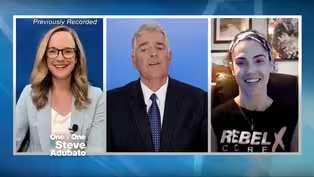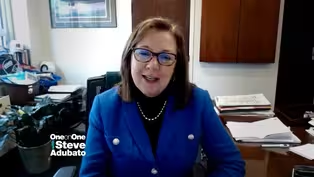One-on-One
Lifelong learning, collaboration, and leadership
Clip: Season 2024 Episode 2745 | 8m 50sVideo has Closed Captions
Lifelong learning, collaboration, and leadership
Steve Adubato and One-on-One Correspondent Mary Gamba are joined by Mary Kate Naatus, PhD, Assistant Provost and Dean of Continuing Education and Professional Studies at Seton Hall University, who talks about the importance of lifelong learning, collaboration, and leadership.
Problems playing video? | Closed Captioning Feedback
Problems playing video? | Closed Captioning Feedback
One-on-One is a local public television program presented by NJ PBS
One-on-One
Lifelong learning, collaboration, and leadership
Clip: Season 2024 Episode 2745 | 8m 50sVideo has Closed Captions
Steve Adubato and One-on-One Correspondent Mary Gamba are joined by Mary Kate Naatus, PhD, Assistant Provost and Dean of Continuing Education and Professional Studies at Seton Hall University, who talks about the importance of lifelong learning, collaboration, and leadership.
Problems playing video? | Closed Captioning Feedback
How to Watch One-on-One
One-on-One is available to stream on pbs.org and the free PBS App, available on iPhone, Apple TV, Android TV, Android smartphones, Amazon Fire TV, Amazon Fire Tablet, Roku, Samsung Smart TV, and Vizio.
Providing Support for PBS.org
Learn Moreabout PBS online sponsorship(upbeat music) - Recently, my colleague Mary Gamba and I had a conversation with Dr. Mary Kate Naatus.
Mary Kate is the Assistant Provost and Dean of Continuing Education and Professional Studies at Seton Hall University, one of our higher-ed partners.
We had a conversation about the value of higher education, teaching leadership to college students.
The value of a global education, turning students into more global citizens, even though they're just sitting there with their phones on Instagram and you live in your own world here.
It's challenging, it's difficult.
College higher education today, a conversation with Mary Kate Naatus, right here.
- Mary Kate, good to see you.
- Absolutely.
It's a pleasure to be here today.
Thank you Steve, and thank you, Mary.
- So teaching, coaching leadership for younger people, do you think it's in any way significantly different coaching, teaching, mentoring younger people about leadership today as opposed to 10 years ago, and if so, how?
- I do think it's different, Steve, and thank you for asking.
I think that as much as possible as educators, we need to provide opportunities for students to have experiential learning.
Meaning, we provide the basics, we provide frameworks, but at the same time they need to learn by doing.
So exposing students to situations where they're uncomfortable, where they need to take a risk, where they have to step out of their comfort zone and develop those leadership skills, which sometimes are a little bit painful along the way.
Those are the most rewarding experiences.
And I think in the post-pandemic era with a lot of our students having spent a number of years in a fully virtual environment, it's even more important that we create those uncomfortable experiential social context where they have to navigate in new situations.
And, you know, I think that was always valuable, but I think today it's absolutely necessary.
- Mary, what's our favorite expression about being comfortable?
- We have to get un- we have to get comfortable being uncomfortable.
- And Mary Kate, we say that in our seminars, and people go, no, no, no, I don't want to be uncomfortable.
And our response is, trust us.
We won't make it dangerous, but we will put you in a situation where you have to present an idea that you have to the board of trustees or decision makers, or you're gonna do this Q&A because you've already presented and now you're gonna have tough questions and it makes you uncomfortable.
And they'll say, well, how does that make me better?
And the answer should be obvious.
You don't grow until you get to the edge of your comfort zone.
But all of us want to stay in the comfort zone.
I'm off my soapbox, Mary.
Jump back in.
(Mary laughs) - Well, sometimes I swear you could read my mind.
My next question was gonna have everything to do with lifelong learning.
When we had met a couple of, I guess, a little while ago, we had talked a little bit about your passion for lifelong learning and what you're doing in the continuing education area.
Talk about where that passion for you came from and how you're working to instill that in the students, in your orbit as well.
- Yeah, absolutely.
So I love the concept of life-long learning.
It's become a little bit of a buzzword, but it's very true because you can go and get a degree, you can get a master's degree, you can get a law degree or a PhD, but the world around us is so rapidly changing.
And I feel like with the onslaught of artificial intelligence, that has never been truer.
So what I learned in my PhD classes many years ago, a lot of it has changed, the way work is done in the field of business has changed.
So we need to provide opportunities for our students who are investing at our universities for four years, for six years, the opportunity to constantly up-skill, so that their skills remain relevant in the workforce, in the industries and also in life in general so that they feel like they have the tool chest and the competencies to be able to achieve their greatest potential no matter what it is that they do.
And I think every single field or industry that we could think of is disrupted, not only by AI, but also other rapid technological changes.
And, you know, seeing the world gaining global competencies, I would include that among that lifelong learning that is so enriching on many levels.
- I'm curious about something.
There are people, more people than ever, questioning the value of higher education, questioning whether you even need it or not, and some don't.
Some can have great careers, be very happy and successful without college.
What do you say to those who question whether, not just whether you need a college education or not, what college could and should do for young people in these very challenging times?
I know it's a big picture question, but Mary's, put it this way, her two boys, going to great schools.
Our kids were blessed and fortunate.
They're going to great colleges and universities.
Our daughter talks about where she wants to go even though she's just in eighth grade, but that's not everyone who A, who has the ability to do it.
B, there are some folks who are saying, I question the value of it, whether it's even worth it.
'Cause it ain't cheap.
Please.
- Right.
I think that every study that you read that tries to monetize and quantify the value of a college education, they all seem to come out with substantial additional earnings over the course of a lifetime, substantial job satisfaction.
But that's not to belittle the trades.
I completely respect the trades and people who go into those areas as well.
So, you know, considering the huge investment that families must make to afford a college education, and I also have a son in college and two other children who will be approaching college age soon, I know that is very real.
We, as the higher ed institutions, need to make sure that we're not just sitting on our laurels doing things the way we've always done them, and we need to be including every opportunity.
Yes, our students need to learn the liberal arts and they need to be good thinkers and critical thinkers, but they also need to have job-ready skills.
And we need to help create pathways for them, so that they gain the experience while they're still in college, setting them up for success so that there's an ROI that we can convince parents and families is there.
And it's not just something that's sort of, you're on your own to deal with.
I don't want to overly focus on that, but I think it's extremely important, especially considering that investment.
- To Mary Kate's point.
Mary and I often say the biggest enemy in the world of leadership and organizational life is the status quo.
Meaning, we're good the way we are.
There is no such thing for those who've watched our program before, they know I say it all the time, status quo is not really an option, even when you're really good, because that means you're not growing, and you're not evolving, and you're losing to the competition.
That being said, Mary Kate, I want to thank you for joining us, and talking about leadership, and a whole range of other issues connected to higher ed.
Mary Kate, all the best.
Talk soon.
- Thank you so much, Steve.
Thank you, Mary.
- [Narrator] One-On-One with Steve Adubato is a production of the Caucus Educational Corporation.
Celebrating 30 years in public broadcasting.
Funding has been provided by NJM Insurance Group.
Johnson & Johnson.
New Jersey Sharing Network.
The Turrell Fund, a foundation serving children.
The New Jersey Economic Development Authority.
IBEW Local 102.
The Port Authority of New York and New Jersey.
Horizon Blue Cross Blue Shield of New Jersey.
And by The Fidelco Group.
Promotional support provided by The New Jersey Business & Industry Association.
And by NJ.Com.
NJM Insurance Group has been serving New Jersey businesses for over a century.
As part of the Garden State, we help companies keep their vehicles on the road, employees on the job and projects on track, working to protect employees from illness and injury, to keep goods and services moving across the state.
We're proud to be part of New Jersey.
NJM, we've got New Jersey covered.
Stephanie Rogers talks entrepreneurship & leadership
Video has Closed Captions
Clip: S2024 Ep2745 | 9m 56s | Stephanie Rogers talks entrepreneurship & leadership (9m 56s)
Trish O’Keefe addresses nursing & the future of healthcare
Video has Closed Captions
Clip: S2024 Ep2745 | 9m 10s | Trish O’Keefe addresses nursing & the future of healthcare (9m 10s)
Providing Support for PBS.org
Learn Moreabout PBS online sponsorship
- News and Public Affairs

Top journalists deliver compelling original analysis of the hour's headlines.

- News and Public Affairs

FRONTLINE is investigative journalism that questions, explains and changes our world.












Support for PBS provided by:
One-on-One is a local public television program presented by NJ PBS

